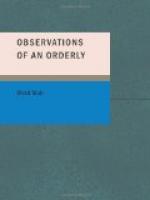I am afraid that another triviality which has hitherto been to the taste only of the south of England is fated to “catch on,” by means of the same missionaries, from Land’s End to John o’ Groat’s, and even in the colonies. Rhyming slang is extraordinarily common in the army, so common that it is used with complete unconsciousness as being correct conversational English. My friend of the king-like toe spoke of his feet as “plates of meat”—and this though he was an Australian, not a cockney. If he had had occasion to allude to his leg he would probably have called it “Scotch peg.” A man’s arm is his “false alarm”; his nose, “I suppose”; his eye, “mince pie”; his hand, “German band”; his boot, “daisy root”; his face “chevvy chase”; and so forth—an interminable list. What exactly was the raison d’etre of this pseudo-poetic mania I do not know, but I suspect that it originated, in the distant past, with the poverty of rhyme-invention on the part of the writers of the cruder kind of pantomime songs—“round the houses,” for example, being both a rhyme to and a synonym for “trousies” (garments beloved of those bards!)—and thus the vogue developed. This is only a theory. The one thing certain is that a clumsy form of slang, devoid of the humour and compactness which justify slang—and which were on the whole once characteristic of metropolitan slang—has tickled the ear of some millions of men who, but for the war, would never have fallen under its temptation. The only thing to hope for is that it will run its course and perish—like “What ho, she bumps!” and “Now we shan’t be long!”—without leaving any visible and permanent trace upon the language.
“Clicked,” another word used by my trench-feet associate, resembles much modern slang in the breadth and elasticity of its application. To click can be either advantageous or baneful, according to the circumstances. A soldier asks a superior for a favour, and it is granted. That soldier has clicked. Or if he finds a nice girl to walk out with, he has clicked. Or if he is given a coveted post, he has clicked. But he has also clicked if he is suddenly seized on to do some menial duty. He has clicked if he is discovered in a misdeed. And he has clicked a packet if he gets into trouble generally. On such an occasion, it may be added, the N.C.O. or officer who administers a reproof ("ticks him off"), and does so in angry terms, “goes in off the deep end.”




